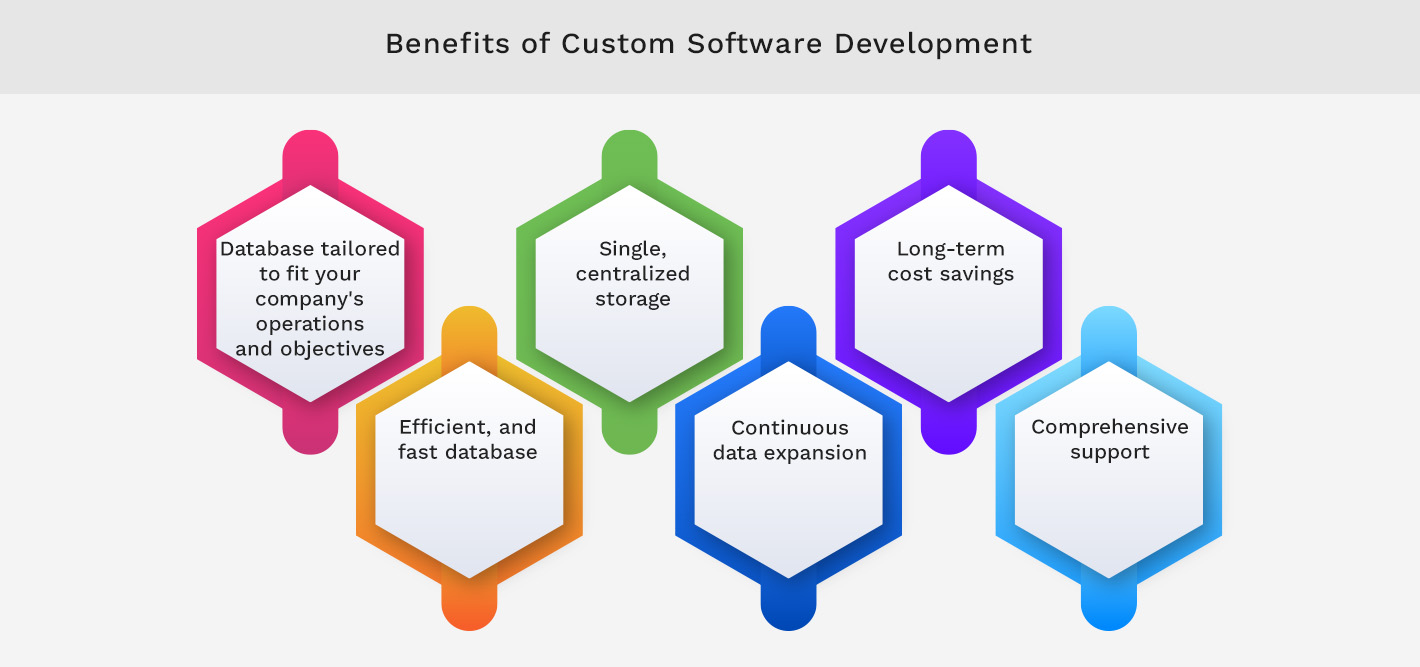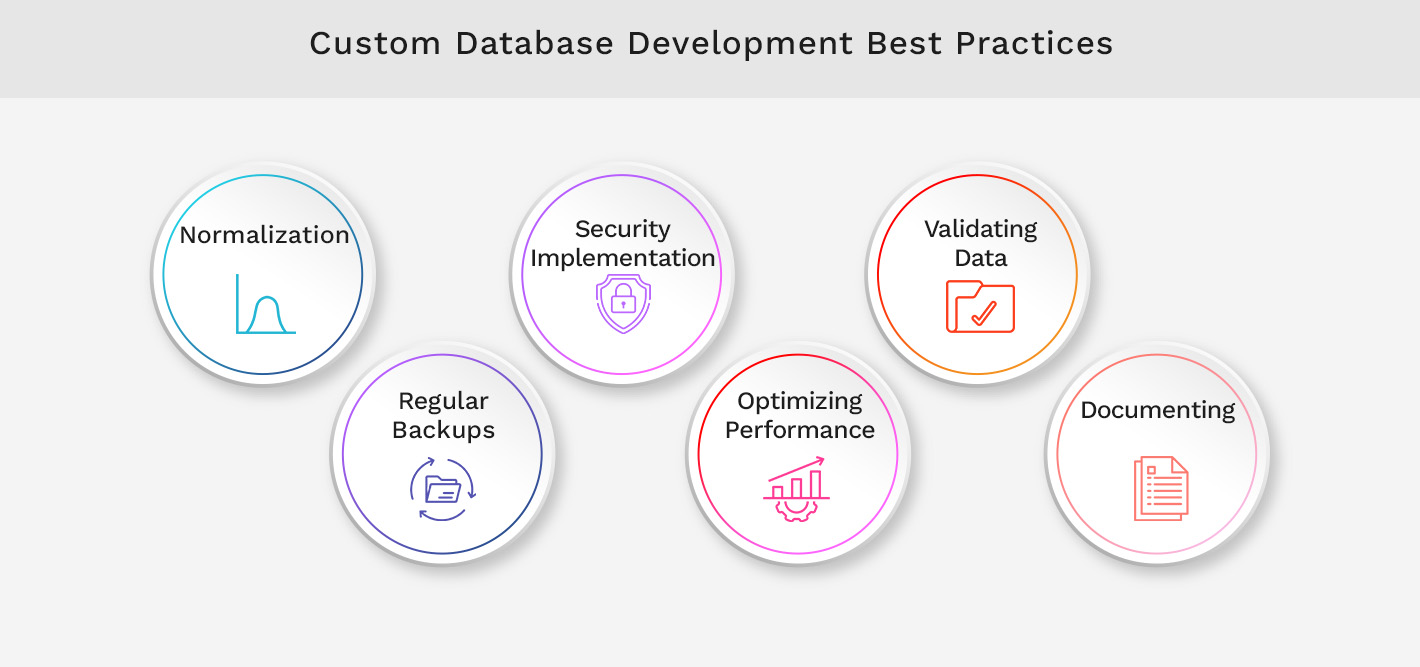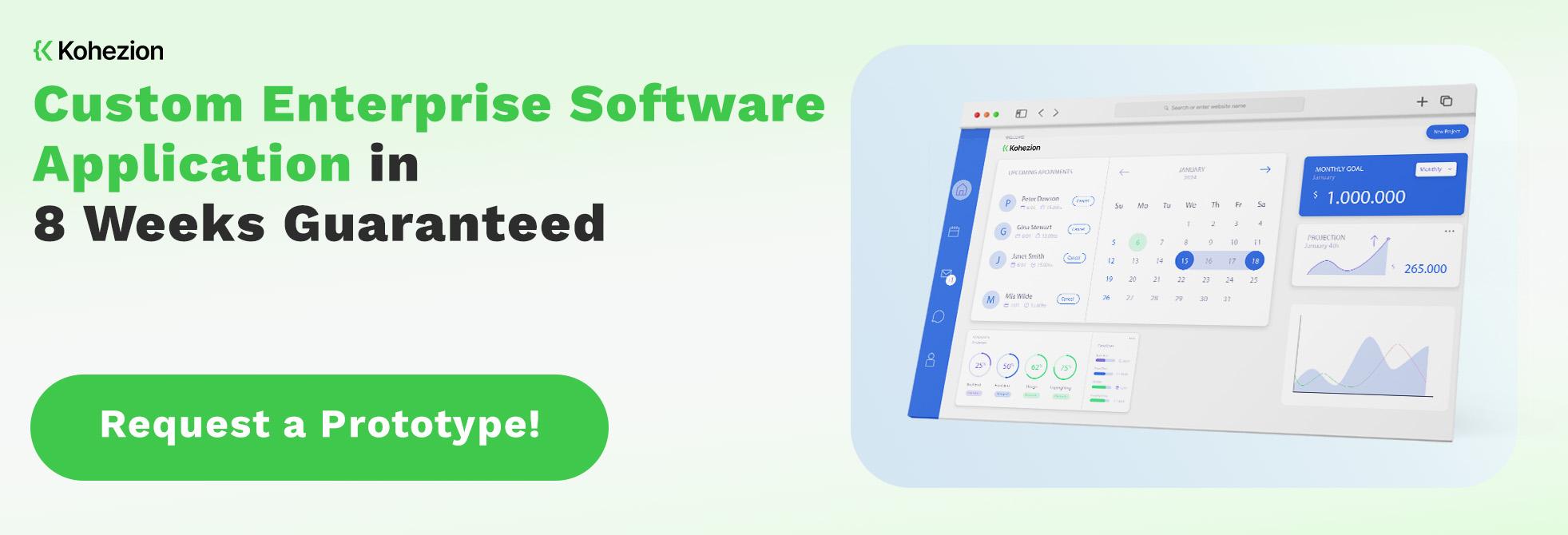Did you know custom databases can be more useful and cheaper than ready-made software? Some business owners might think hiring a pro to create a custom database is costly, but it's often the opposite. Each business is unique, so why settle for a one-size-fits-all solution when you can have a database tailored to your specific needs?
This guide explores everything you need to know about creating databases tailored to your specific needs. From understanding the basics to implementing best practices, you'll gain insights into building effective databases for your business.
We'll buid your first application for you. At no extra cost.
Let us build your first business application for free. Go from an idea to an application in under 2 weeks.

What Is Custom Database Development?
Custom database development means creating a database ecosystem tailored to your business's precise specifications and demands. It's a carefully engineered platform where each element is designed to streamline and optimize the way you collect, store, access, and use your data.
Why You Should Have a Custom Database?
A custom database is a multifunctional tool tailored perfectly for the tasks. It drives precision, improves workflows, and enables richer data relationships that are impossible with off-the-shelf options.
A custom database empowers you to harness your data's true potential, serving as a backbone for decision-making and strategic direction. They efficiently adapt to shifts in your business, allowing for growth without the pains of migration or costly downtime.
Benefits of Custom Software Development
If you are looking for reasons to invest in custom software development, here are some benefits to help your business grow and thrive.
Database tailored to fit your company's operations and objectives
Developing a custom database means crafting a framework that syncs with your company's operations and aspirations. It ensures that each function and feature is custom-built to propel you toward your objectives. Whether you need sophisticated data analytics, effortless data sharing across departments, or complex data entry systems, a custom database is designed with your unique business journey in mind.
Efficient, fast database
A custom database allows you to handle queries at lightning-fast speeds and ensure a smooth user experience. This means no more waiting around for data retrieval or processing. This tailored efficiency streamlines your operations, reduces wait times, and enables your staff to respond to business needs with agility and informed precision.
Single, centralized storage
A custom database brings together all your data under one roof, making it easily accessible and manageable. This centralization simplifies processes and provides a cohesive view of the organization's information, improving collaboration and decision-making. It also lays the foundation for robust data integrity and consistency throughout your business operations.
Continuous data expansion
Continuous data expansion means they can effortlessly accommodate additional data, more users, higher transaction volumes, and emerging business branches. Your database evolves as your business does, ensuring you can embrace growth opportunities.
Long-term cost savings
A custom database is a strategic investment that will pay dividends well into the future of your enterprise. A custom database reduces infrastructure and administrative overheads and optimizes data structures and query performances. It reduces time-intensive manual processes and frees your team to focus on core business activities.
Comprehensive support
From initial setup to ongoing maintenance, expect a dedicated team offering personalized service to ensure your database runs smoothly, securely, and efficiently. Whether it's routine checkups, performance tuning, or addressing unexpected hiccups, they will ensure your data management remains in top form.

Custom Database Development Best Practices
In this section, we share some simple yet effective best practices to ensure your database development process is smooth and successful. These practices will help you design a database that meets your specific needs and ensures data integrity and security.
Normalization
Normalization ensures each piece of data has its rightful place without unnecessary duplication. Your data is divided into well-organized tables, crafting a structured environment that improves performance and simplifies maintenance. Following these normalization rules helps you build a database that's efficient and resilient to data anomalies and integrity issues.
Regular Backups
Regular backups protect against data loss from unforeseen events like system failures, accidental deletions, or cyber-attacks. They craft a backup schedule that ensures no critical piece of data slips through the cracks. With these backups in place, you can restore operations smoothly and swiftly when required.
Security Implementation
Integrating layers of defense, such as robust access controls, encryption, and comprehensive auditing capabilities, protects your data against intrusions and breaches. Adopting best practices such as multi-factor authentication and facial recognition ensures that the highest security standards protect your sensitive assets.
Optimizing Performance
Optimizing performance means fine-tuning your database to ensure it delivers quick response times and a smooth user experience. Analyze and refine every aspect, from indexing to query optimization, so that your database can handle the current data load but is also prepared for future increases.
Validating Data
Validating data helps maintain the trustworthiness and utility of your custom database. Engage in rigorous testing to ensure that all information is accurate, consistent, and meets quality standards. Continuous validation will protect you against data corruption and ensure the integrity of data input and output. Carrying out comprehensive checks like constraint enforcement and referential integrity bulletproofs your database's reliability.
Documenting
Documenting provides clear guidance on your database’s structure and operations. Create comprehensive documentation to help everyone understand how to navigate the system effectively. This documentation also chronicles design decisions and data relationships, providing an invaluable reference point for current operations and future improvements.

Develop Your Custom Database with Kohezion
Kohezion can help you build a bespoke database solution that ticks every box of your business's checklist. Our hands-on approach combines two decades of expertise with keen attention to your requirements. This results in a database system that's robust, scalable, and a perfect fit for your operations.
Imagine the possibilities when your existing systems are refashioned into something more structured, secure, and sophisticated. Kohezion will deliver improved data management and informed analytics and ensure an enriched end-user experience.
Conclusion
Developing a custom database means creating a system that streamlines and secures your data management, aligning seamlessly with your goals and growing along with your business. Adhering to best practices such as normalization, regular backups, and security measures ensures a superior database and a robust foundation for your business operations.
Choosing the right development partner, like Kohezion, can transform this process into an insightful and rewarding journey. We're committed to architecting a future-proof database that delivers efficiency and has a real impact on your bottom line.
Contact us for a consultation and take the first step toward a database that will transform your business insights, productivity, and cost efficiencies.
Start building with a free account
Frequently Asked Questions
Yes, a custom database is designed with integration in mind. It can seamlessly connect with your existing systems and workflows, ensuring a smooth transition with minimal disruption to your business processes.
The timeline for developing a custom database ranges from a few weeks to several months, depending on complexity and specific requirements.
We implement state-of-the-art encryption, rigorous access controls, and ongoing vulnerability assessments to safeguard against threats and ensure data privacy and compliance.
Post-development, we offer round-the-clock support, regular updates, and proactive maintenance to keep your database optimized and running without a hitch. This ensures that your operations are continually smooth and secure.
Custom database development provides scalable solutions that evolve with your company. It offers insights and improves operational efficiency to drive competitive edge and customer satisfaction.


